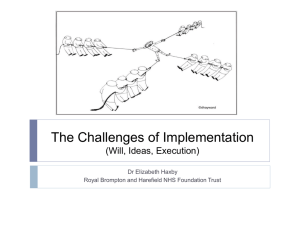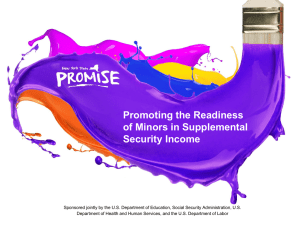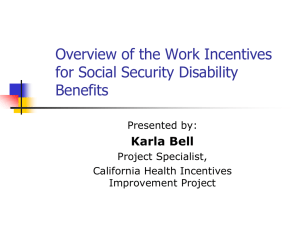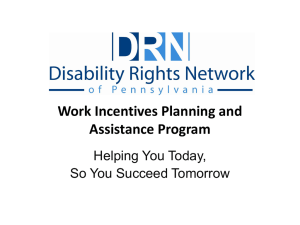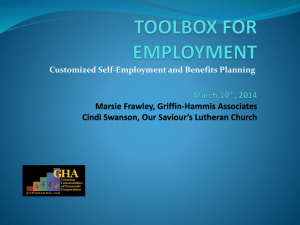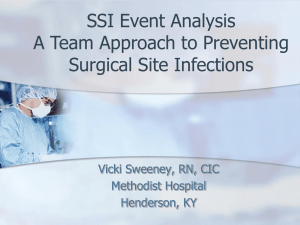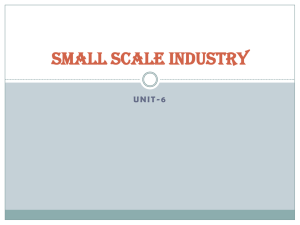(SSI) PowerPoint Presentation ()
advertisement
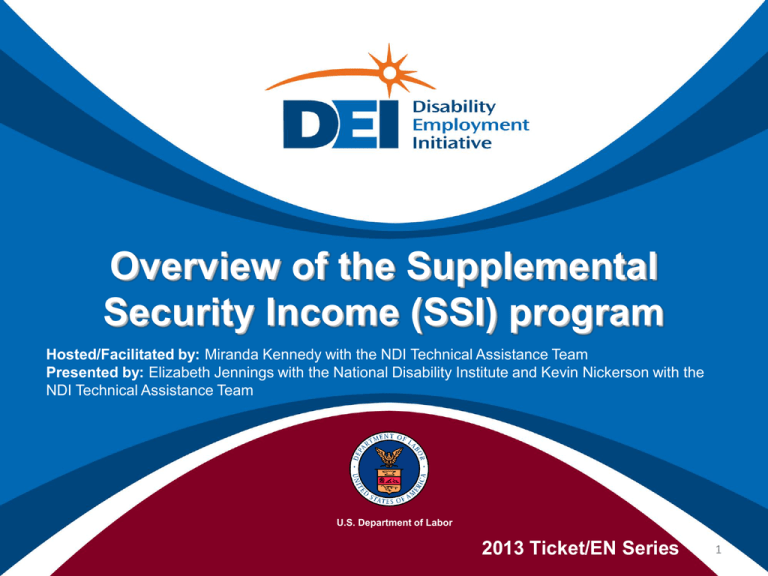
Overview of the Supplemental Security Income (SSI) program Hosted/Facilitated by: Miranda Kennedy with the NDI Technical Assistance Team Presented by: Elizabeth Jennings with the National Disability Institute and Kevin Nickerson with the NDI Technical Assistance Team U.S. Department of Labor 2013 Ticket/EN Series 1 Disability Employment Initiative (DEI) • DEI Projects at the state level and/or local level participating LWIBs are required to become Employment Networks under Social Security Administration’s Ticket to Work Program. • Training and Technical Assistance to DEI Projects in attaining Employment Network status and implementing effective EN operations is provided under U.S. DOLETA contract with NDI Consulting, Inc. and the National Disability Institute (NDI). • Evaluation of the impact of the DEI Projects implementation and outcomes as Employment Network will be provided under U.S. DOL ODEP contract with Social Dynamics. 2 Learning Objectives Upon completion of this training webinar, DEI grantees and participants and partners from the public workforce system will : • Understand the basics of the Supplemental Security Income (SSI) program • Have basic knowledge of key Work Incentives specific to the SSI program • Understand the value of Work Incentives, and how they can apply to the work of an EN • Next Steps 3 Subject Matter Expert Elizabeth Jennings Director of Training and Technical Assistance, National Disability Institute ejennings@ndi-inc.org 4 Agenda • Overview of SSA disability programs, and eligibility requirements • Review of Work Incentives associated with the SSI program • Options for returning to disability benefits, if needed • Time for Q & A 5 Overview of SSA disability programs, and eligibility requirements 6 What is SSI? • Supplemental Security Income (SSI) is a Title XVI program • SSI is the payer of last resort • An individual must prove that they are financially eligible for SSI (needs based) • Monthly income less than $710/month • Assets less than $2000 (for single individuals) • Eligible couple = $1066/month and $3000 assets • Federal Benefit Rate Maximum: 2013 equals $710 per month • Medical Insurance = Medicaid 7 Federal Benefit Rate (FBR) • Not everyone receives the full benefit amount • The rate of pay an individual is eligible for is based on: - Family composition (i.e. living alone, with others, etc.) - Marital status - Deeming of income - Type of housing (i.e. congregate care) - In-Kind support and maintenance 8 SSI Income At-A-Glance • Supplemental Security Income (SSI) is a Title XVI Program • Income: Anything received in cash or in kind that can be used to meet needs for food or shelter • Two Types of Income: Earned Income and Unearned Income Earned Income: Typically, gross wages - salaries, commissions, bonuses, self-employment; sheltered workshop earnings Unearned Income: All income that is not earned income. Unearned income is counted when it is actually or constructively received 9 SSI: Resources At-A-Glance • Resources: Cash or other liquid assets or real or personal property that an individual owns and could convert to cash which can be used to provide for food or shelter. • The general rule is that an item received in a month is income and, unless spent, becomes a resource in the following month. • General resource limit in 2013 is $2,000 for an individual, $3,000 for an eligible couple (Note: This rate was established on 1/1/89) 10 Review of Work Incentives associated with the SSI program 11 SSI Work Incentives & Wages SSI Work Incentives enhance economic stability and can protect Medicaid Student Earned Income Exclusion Impairment Related Work Expense (IRWE) Blind Work Expense Plan For Achieving Self-Support (PASS) Property Essential for Self-Support (PESS) 1619a 1619b Section 301 Special Condition/Subsidies Expedited Reinstatement 12 SSI Budget Example: Earned Income Only NOTE: FBR = $710.00 (this is a single person, living alone rate for 2013, includes Federal Benefit Rate ONLY) STEP 1: (calculate countable earnings) Earned income = $1,120 Apply G.I.E. Apply 2 for 1 rule - $20 $1,100 - $65 $1,035 /2 Total countable income = $517.50 Apply E.I.E. STEP 2: (adjust SSI based on FBR) FBR = Subtract T.C.I. $710.00 $517.50 $192.50 (New SSI) Adjusted SSI = $192.50 Plus earnings = $1,120.00 $1,312.50 G.I.E. = General Income Exclusion E.I.E. = Earned Income Exclusion T.C.I. = Total Countable Income F.B.R. = Federal Benefit Rate 13 Student Earned Income Exclusion (SEIE) • The SEIE allows an individual who is under age 22 and regularly attending school to have earnings excluded from income as shown below: • For Year 2013, Monthly Exclusion is $1730, Maximum exclusion for calendar year is $6,960 • Effective 4/01/05 To qualify for this exclusion, an individual must be: – under age 22; and – a student regularly attending school per 00501.020D. SI 14 Impairment Related Work Expense (IRWE) IRWE reduces gross income due to disability-related out of pocket expenses that allow a person to earn income, even if those items or services are needed for non-work activities The following must apply: – Expenses must be directly related to supporting the disability – Cost must be paid out of person’s pocket and not covered by other funding sources – Expense must be paid in a month wages are earned – Expense must be reasonable 15 Plan to Achieve Self-Support (PASS) • The purpose of PASS is to allow SSI recipients to set aside income and/or resources to be used to assist in achieving specific work goals – A PASS can be used to assist in the costs of education, starting a business or purchasing support services that will result in the reduction / cessation of benefits • By utilizing PASS, an SSI recipient can help to off-set the costs associated with the return to gainful employment by reducing countable income and potentially increasing the amount of SSI cash benefits due. 16 Plan to Achieve Self-Support (PASS) The PASS must: • Have a specific work goal • Have a specific time frame for reaching the goal • Show what money and any other contributions will be used to reach the work goal • Show how any money set aside in savings will be kept separate from other funds • Show how the money and resources will be saved and, later, spent • Be submitted in writing and approved by Social Security’s PASS Cadre • Include a Business Plan if the PASS is for self-employment • Be reviewed periodically to assure compliance • Increase an individual’s ability to be self-supporting by decreasing the amount they receive in cash benefits from Social Security www.passonline.org 17 SSI & Section 1619(b) Medicaid Protects Medicaid when SSI Cash Benefit is Zero: The person must lose eligibility for SSI cash benefits due to excess earnings (not unearned income) Person must be otherwise eligible for SSI Person must need Medicaid to Work Earnings must be below State’s Earned Income Threshold: www.ssa.gov/disabilityresearch/wi/1619b.htm#threshold 18 Ticket/EN Subject Matter Expert Kevin Nickerson E: knickerson@ndi-inc.org P: (607) 272-7570 Ext. 136 19 20 Options for returning to disability benefits, if needed 21 Options for Returning to Rolls • Re-Application • Expedited Reinstatement (EXR) 22 Good Record Keeping • Open SSA mail immediately • Keep EVERYTHING SSA sends • Make copies of EVERYTHING sent to SSA • Report new work activity to the local SSA Office (in writing, keep a copy of letter sent) • Provide wage data to SSA regularly by providing a copy of pay check stubs – Wage data may be FAXED, hand delivered, mailed, or reported by phone • For more information about wage reporting by phone: http://www.ssa.gov/ssi/spotlights/spot-telephone-wage.htm – Be sure to write your S.S. # on pay check stubs, and your name if not already printed on check stubs 23 Questions/Comments If you have a comment or question you can: A: Submit it to the host in writing via the Chat or Q&A Box to the right, or… B: Click on the “raise hand” icon to have your line un-muted and ask your question/make your comment. 24 Summary In today’s presentation we covered the following: • Basics of SSI benefits program • SSI Work Incentives, and how they can assist beneficiaries in the return to work • Options for maintaining health insurance while working 25 Next Steps Plan to attend the next training in this series: Tuesday, March 26th (3:00pm – 4:00pm EST) Part 5: Ticket to Work and Benefits Planning, Other State and Federal Work Incentives Upon completion of this training you will: • • Have basic information about complimentary non-SSA incentives that SSA beneficiaries can and should utilize Recognize coordinating work incentives and how they are designed to increase an individual's work effort We look forward to seeing you in D.C. in March! 26 Contact Information Elizabeth Jennings Director of Training and Technical Assistance National Disability Institute E: ejennings@ndi-inc.org Kevin Nickerson NDI Technical Assistance Team E: knickerson@ndi-inc.org P: (607) 272-7570 Ext. 136 27

